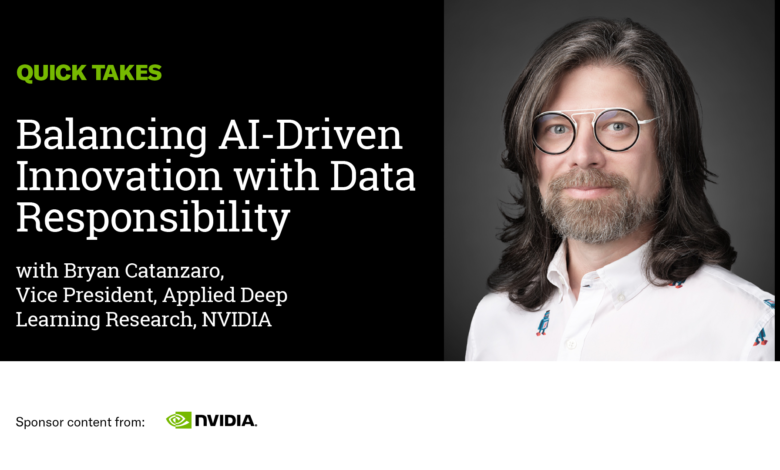Video Quick Take: Balancing AI-Driven Innovation With Data Responsibility

Post
Post
Share
Annotate
Save
Julie Devoll, HBR
Welcome to the HBR Video Quick Take. I’m Julie Devoll, editor for Special Projects and Webinars at Harvard Business Review. Artificial intelligence shows tremendous promise for organizations looking to innovate and disrupt. But many leaders are finding it’s not easy to balance their AI ambitions with handling their most precious resource, which is data.
Today, we’re here with Bryan Catanzaro, who’s VP of Applied Deep Learning Research at NVIDIA. Bryan is at the forefront of AI development, and he’s here with us today to discuss how AI is driving transformation and data evaluation at organizations everywhere. Bryan, thank you so much for being with us today.
Bryan Catanzaro, NVIDIA
Glad to be here.
Julie Devoll, HBR
OK, so let’s get started. So AI has made tremendous progress in unlocking new possibilities and innovations. How do you see AI transforming the ways people connect, communicate, and innovate? And where do you see it going?
Bryan Catanzaro, NVIDIA
Innovation is really about learning. It’s about iterating on ideas and trying to understand new ways of thinking about problems. And often, when we’re doing this kind of work, we get stuck in the mechanics of it. I don’t know how many times I’ve opened up my email client to write an important email and just wasn’t sure where to get started.
The thing that’s so amazing about AI is that it’s helping us iterate on our ideas much more quickly and much more collaboratively so that we can find better solutions and work at a higher level of abstraction with deeper meaning.
Julie Devoll, HBR
We know data is a precious resource for today’s companies. Bryan, what should they be thinking about as far as valuing and using their data, especially in sectors where you’re seeing AI disrupting business models?
Bryan Catanzaro, NVIDIA
So I believe that every business is built around a secret, and that secret might have to do with the culture of the business or its business model or its market platform or maybe technology. And along with that secret comes a lot of data that shows how the company works with its confidential, proprietary ways of doing its business. And that means that the most useful data to AI is always going to be the most secret data.
So there’s a tension between the sort of AI-first way of solving problems, which is, let’s throw all the data into one model, which might actually get amazing results, but risks compromising the secret that drives a business, versus making custom models that are targeted to understand small amounts of the company’s data and are used in very targeted ways.
I think we’re going to have to find policies that allow us to do both in the right way. And I think every business needs to be thinking about the way that we trade off the secret data that we have versus access to AI.
Julie Devoll, HBR
Company leaders who are trying to tap AI’s potential have to figure out how to balance driving innovation with responsible data stewardship. How do you think they should go about navigating that challenge? And are there any best practices that you can recommend?
Bryan Catanzaro, NVIDIA
The first thing that I tell companies is to work on evaluations. It’s sometimes hard to figure out what does success look like when deploying AI, but the good news is, you can do that independently from the process of deploying it. You can work on that right now, looking at the most important problems your company faces that you might potentially solve with AI, and then developing success stories that show what would an AI have to do in order to help.
AI, every day, is getting easier to customize and deploy inside of businesses in all the ways that we need it to be deployed. So I would say, go ahead and develop your understanding of how AI could potentially help you. And then you’ll be ready to deploy it once the adaptation mechanisms become available.
Julie Devoll, HBR
Well, Bryan, thank you so much for joining us today and sharing your insights about AI’s role in driving innovation.
Bryan Catanzaro, NVIDIA
Glad to be here.
Julie Devoll, HBR
To learn more, click the link below.



